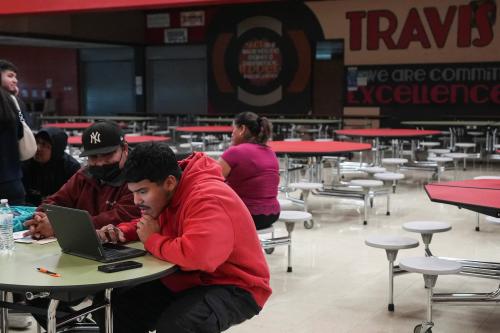A glimmer of hope in the debate over student loan interest rates briefly appeared this week with the release of the first bipartisan proposal to address the impending doubling of interest rates on subsidized student loans, only to be dashed by the Democratic leadership in the Senate. The new proposal, from a group of senators including three Republicans, two Democrats, and one Independent, offers a permanent fix to the now-annual problem of Congressional meddling with interest rates by instead tying rates to the market.
The bipartisan compromise bill one-ups existing proposals by not only heading off the doubling of interest rates on subsidized loans, but also reducing rates on the unsubsidized loans taken out by millions of students from middle-class families each year. By charging higher rates to graduate students and on the PLUS loan program for parents, the overall plan is close to budget-neutral according to the Congressional Budget Office.
Is this plan the ideal policy? Plans aimed at achieving political compromise almost never are, and this one is no exception. For example, it leaves in place subsidies to students that are better delivered through up-front grants that directly reduce the cost of college. And estimates of the policy’s costs are still made using a methodology that does not adequately take into account the risk inherent in student lending.
But the proposal contains key features of good policy on student loans—most notably market rates that are fixed for the life of the loan—and combines elements of prior proposals from House Republicans, Senate Democrats, and President Obama—a rarity in Washington these days. Disagreement remains over the issue of whether rates should be capped, but a cap is unlikely to matter much given current projections of future interest rates and the consolidation cap that allows students to refinance their loans at lower rates should market rates rise dramatically.
Unfortunately, the possibility of something constructive getting done in Washington was quickly squashed by the Democratic leadership in the Senate. Education committee chairman Sen. Tom Harkin is sticking to his proposal of kicking the can down the road, a repeat of last year’s outcome despite the emergence of serious long-term proposals. Sen. Elizabeth Warren argues that the can-kicking strategy “buys us the time” to come up with a long-term solution.
But the last thing Congress needs is yet another clock to run down, and next year’s campaign season is going to be no more conducive to sensible policymaking than last year’s. Furthermore, if the Democrats in Congress want to win the argument that their Republican colleagues are do-nothing obstructionists, they have to stop dismissing good ideas that have support in their own party, across the aisle, and in the White House.



Commentary
Democrats Blow It on Student Loan Interest Rates
June 28, 2013